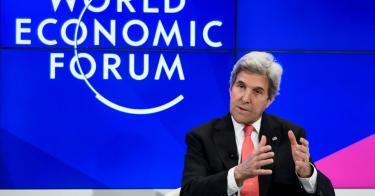In a World Economic Forum virtual panel discussion, “The Great Reset: Building Future Resilience to Global Risks,” on Wednesday, panelists sought to address “what new forms of cooperation, bold ideas, and reforms are needed for business, policymakers, and civil society to build a more resilient world and restore confidence in leadership beyond COVID-19.”
The buzzword for the discussion was “the great reset.”
>>> What’s the best way for America to reopen and return to business? The National Coronavirus Recovery Commission, a project of The Heritage Foundation, assembled America’s top thinkers to figure that out. So far, it has made more than 260 recommendations. Learn more here.
Indeed, 2020 has been an extraordinary year for the global economy, with slowing growth and turmoil gravely inflicted by the ongoing pandemic.
The principles of economic freedom have always been questioned by dictators, autocrats, and others who might benefit from centralized planning and control. Now, however, populist attacks on the free market—fueled by election-year politics in the United States and other countries, as well as by actual coronavirus-related setbacks to the economy—have gained momentum.
Fundamentally, a nation’s capacity to grow and prosper hinges on the quality of its institutions and economic system, as shown by The Heritage Foundation’s Index of Economic Freedom.
For more than a quarter of a century, the index has measured, country by country, the advances and retreats in economic freedom around the globe. In the process of doing that, the index has underscored a strong linkage among economic freedom, prosperity, and resilience.
As the index has cataloged, nations with higher degrees of economic freedom prosper more quickly and more surely. That’s because they capitalize more fully on the ability of the free market system not only to generate, but also to reinforce, dynamic growth through efficient resource allocation, value creation, and innovation.
Regrettably, some of the policy measures undertaken or planned by governments around the world in response to the global health crisis run the risk of undermining economic freedom and, thus, long-term economic growth and prosperity.
Policymakers in Washington and around the globe cannot simply spend their way back to prosperity after the toll public health responses have taken on local economies. For a meaningful economic recovery, it’s essential that economic freedom not be curtailed by extended government emergency powers.
The path by which the global economy can emerge from this pandemic stronger than we were before runs through a recommitment to the proven ideas of the free market system.
In times of uncertainty, it’s natural that people look to their governments for answers. Yet the lasting solutions to our current economic problems do not lie in more government controls and regulations. They lie in a return to free market principles.
It would be a tragic mistake to assume that in a time of crisis we must abandon our commitment to economic freedom in the hope of politically resetting the situation. That freedom has unambiguously made our societies strong, vibrant, and flourishing.
Economically free and dynamic societies can provide the effective response and resilience we need now in resurrecting our livelihoods. Restoring what we know has worked in the past is the only “reset” the world needs.
This piece originally appeared in The Daily Signal




